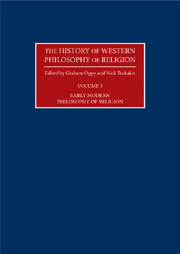Book contents
- Frontmatter
- Contents
- Editorial Introduction
- Contributors
- 1 Early Modern Philosophy of Religion: An Introduction
- 2 Niccolò Machiavelli
- 3 Martin Luther
- 4 John Calvin
- 5 Michel de Montaigne
- 6 Francisco Suárez
- 7 Thomas Hobbes
- 8 René Descartes
- 9 Ralph Cudworth
- 10 Blaise Pascal
- 11 Baruch Spinoza
- 12 John Locke
- 13 Gottfried Wilhelm Leibniz
- 14 George Berkeley
- 15 Voltaire
- 16 The Deists
- 17 Jonathan Edwards
- 18 Thomas Reid
- 19 David Hume
- 20 Denis Diderot
- 21 Immanuel Kant
- 22 Gotthold Ephraim Lessing
- 23 William Paley
- Chronology
- Bibliography
- Index
15 - Voltaire
- Frontmatter
- Contents
- Editorial Introduction
- Contributors
- 1 Early Modern Philosophy of Religion: An Introduction
- 2 Niccolò Machiavelli
- 3 Martin Luther
- 4 John Calvin
- 5 Michel de Montaigne
- 6 Francisco Suárez
- 7 Thomas Hobbes
- 8 René Descartes
- 9 Ralph Cudworth
- 10 Blaise Pascal
- 11 Baruch Spinoza
- 12 John Locke
- 13 Gottfried Wilhelm Leibniz
- 14 George Berkeley
- 15 Voltaire
- 16 The Deists
- 17 Jonathan Edwards
- 18 Thomas Reid
- 19 David Hume
- 20 Denis Diderot
- 21 Immanuel Kant
- 22 Gotthold Ephraim Lessing
- 23 William Paley
- Chronology
- Bibliography
- Index
Summary
François-Marie Arouet de Voltaire (1694–1778) was the author of a wide range of moral, philosophical and political essays and treatises. After experiencing early success as a dramatist, he was exiled from Paris following a quarrel with an aristocrat, and in 1726 he went to England, where the impact made on him by English empirical science and philosophy in the two years he spent in London would be deep and long-lasting. In the early 1730s his reputation as a freethinker grew rapidly, and in 1734, in the wake of various controversies and accusations of religious non-conformity, he took refuge in Cirey in Alsace-Lorraine where he worked with Madame Du Châtelet, one of the leading female scientists of her day, on a translation of Isaac Newton's Principia. In 1750 he accepted Frederick II's invitation to join the royal court at Potsdam. Moving from Prussia to Geneva in 1755, he soon offended the Genevan authorities, and by 1759 he had settled in Ferney, where he remained until his triumphant return to Paris in the last weeks of his life. In the 1760s Voltaire rose to new heights of fame as a result of his militant engagement with the forces of religious dogmatism and intolerance; his personal involvement in a series of sensational causes-célèbres, in which the authority of the state, the Church and the courts was openly challenged, attracted international attention.
- Type
- Chapter
- Information
- The History of Western Philosophy of Religion , pp. 197 - 210Publisher: Acumen PublishingPrint publication year: 2009

